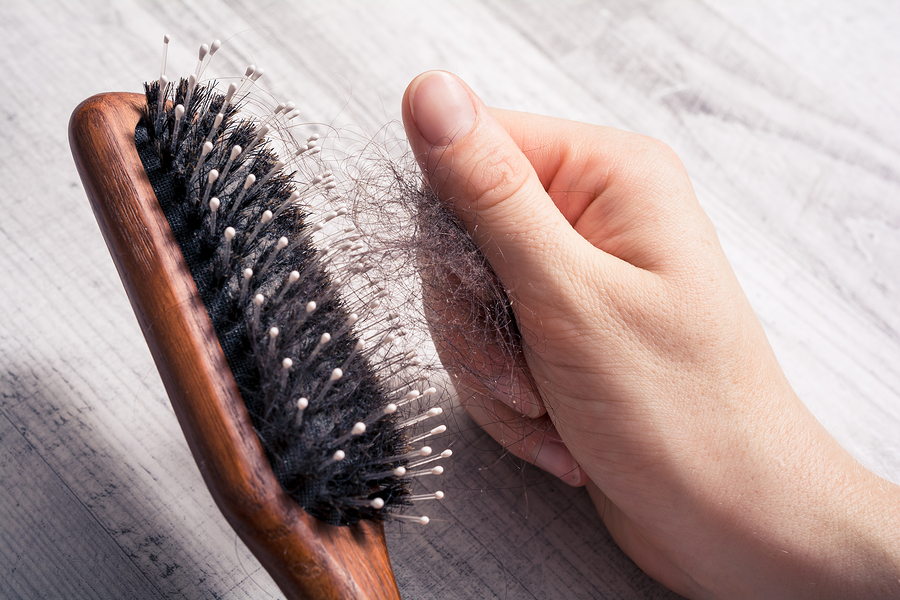5 reasons why your hair might be getting thinner
Thinning hair can be caused by many factors, including genes, diet, stress and illness
Thinning hair isn’t just a problem that men suffer with. Women lose their hair too, and while it’s often to a much lesser extent, it can be just as distressing to deal with.
Reasons for thinning hair can range from simple and temporary – such as a vitamin deficiency – to much more complex underlying health problems.
“Thinning hair is extremely common and can be due to genetics or it can be affected by health and diet,” says Tracey Walker, director of education at The Institute of Trichologists, who notes: “There’s always something which can help, even if the hair loss can’t be cured.”
Here are five reasons why you might be experiencing hair loss or thinning…
1. Stress

Stress and hair loss can be related
Stress caused by accidents, illnesses and operations, as well as certain medications, crash dieting and the build up of every day stresses and anxiety, can lead to something called ‘acute telogen effluvium’, or reflective hair shedding.
The condition can affect both men and women, and as the name suggests, this type of hair loss can be reflective of what’s going on in the body, so if stress is halted or avoided, a full recovery is possible.
2. Diet

Watch out for an unbalanced diet
Hair follicles are among the most metabolically active in the body, and hair growth may be affected by calorie and protein malnutrition, as well as micronutrient deficiency.
Longer-term hair shedding can be caused by low iron levels, which is more common in women.
There’s also evidence vitamin D deficiency may cause hair loss and other hair problems. Vitamin D stimulates hair follicles to grow, so when the body doesn’t have enough, hair may be affected. Vitamin B12 is another common deficiency studies have linked to hair loss.

Hair loss can be caused by a number of factors
3. Thyroid problems
An underactive thyroid or an overactive thyroid can cause both thinning hair and hair loss, because disrupted hormone production affects hair development at the root. When hair falls out, it may not be replaced by new growth, which can result in thinning.
4. Age, genes and hormones

Age can play a part
Male pattern baldness is the most common form of hair loss in men. Age, genetics and testosterone all play a part in both male and female pattern hair loss.
Studies have shown male pattern baldness can result from an over-sensitivity to dihydrotestosterone (DHT), which promotes the growth of facial and body hair. While female pattern hair loss commonly becomes visible after the menopause, due to lowering oestrogen levels, which mean there’s more free testosterone in the body.
The condition can, however, occur at any time of hormonal change, and in a younger woman could indicate polycystic ovarian syndrome.
5. Alopecia
Important! #WednesdayWisdom #alopecia #alopeciaawarenessmonth #thisisme pic.twitter.com/uBij0yNa2Z
— Alopecia UK (@AlopeciaUK) September 26, 2018
There are different types of alopecia, and although it often leads to total hair loss, the first signs are usually temporary hair thinning.
Walker says a type called frontal fibrosing alopecia is becoming more common in post-menopausal women and is often dismissed as general age-related hair thinning. However, if correctly diagnosed, medication can be used to slow or halt hair loss.
There’s also scarring alopecia, also known as cicatricial alopecia, which refers to disorders which can cause hair loss, such as lichen planopilaris, lupus erythematosus and Sjogren’s syndrome.
If you are concerned about your hair or any patches of thinning, always consult your GP for advice.
The Press Association
Latest posts by The Press Association (see all)
- Beatles documentary Let It Be to be released on Disney+ - April 16, 2024
- How to keep your money safe – as criminals ramp up AI tactics to steal consumer data - April 16, 2024
- Seasoned marathon runners give their best race day tips for first-timers - April 16, 2024
- What are heat pumps and could they help your home save energy? - April 15, 2024
- Trailer for Bridgerton season three teases new friends-to-lovers romance - April 12, 2024





















